The ATUNSA fleet carries out responsible and environmentally friendly fishing, aimed at preserving the resource in order to continue supplying tuna caught in a sustainable manner.
As European operators, our activity is regulated by European Union fishing regulations, the most advanced in environmental and sustainability matters, with which we scrupulously comply.
ATUNSA also complies with all the Recommendations and Resolutions of ICCAT and IOTC – the Regional Fisheries Management Organisations of the oceans in which our fleet fishes – which are adopted following the advice of their respective scientific committees.
ATUNSA also actively participates in multiple projects in collaboration with AZTI and the Spanish Oceanographic Institute (IEO).
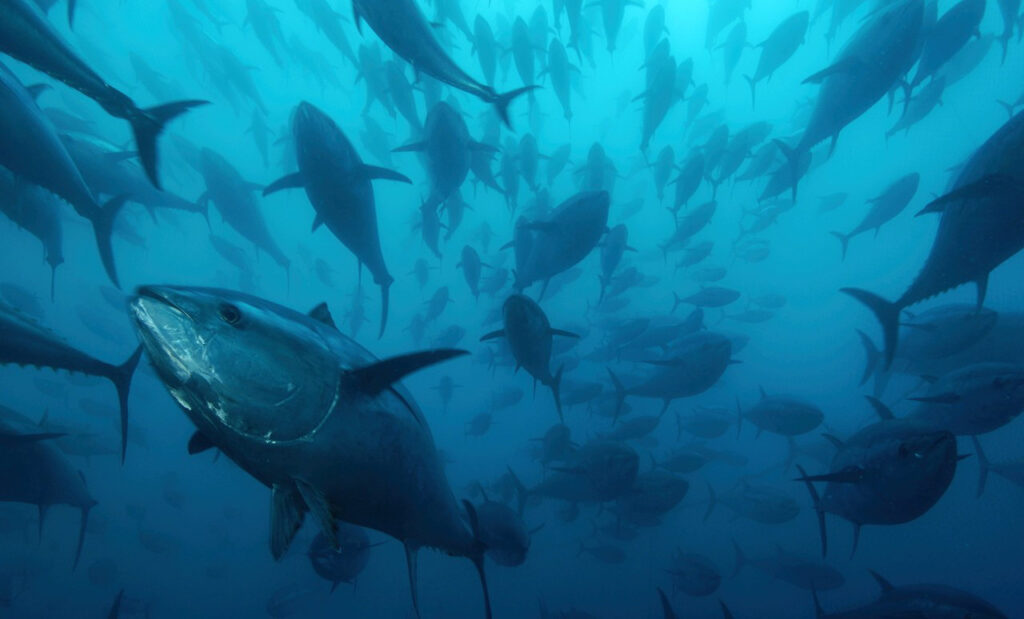
Activity
YELLOWFIN
- Species: Yellowfin (YFT)
- Scientific name: Thunnus albacares (Bonnaterre 1788)
- Classification: Actinopterygii (ray-finned fishes) > Perciformes (Perch-likes) > Scombridae (Mackerels, tunas, bonitos) > Scombrinae
- Distribution area: Worldwide in tropical and subtropical seas (Atlantic, Indian and Pacific oceans), but absent from the Mediterranean Sea.
- Habitat: Highly migratory species. An oceanic species occurring above and below the thermoclines. Pelagic in open water, but rarely seen near reefs. They school primarily by size, either in monospecific or multi-species groups in surface (the younger ones) and deeper (the older ones). Larger fish frequently school with porpoises, also associated with floating debris and other objects. It is sensitive to low concentrations of oxygen and therefore is not usually caught below 250 m. in the tropics.
- Temperature: 15-31ºC (Tropical)
- Maximum length: 280cm, common length till 150 cm
- Maximum weight: 200kg
- Maximum reported age: 8 years.
- Predators: another fishes (tuna fish included) and sharks.
- Feeding: Feed on fishes, crustaceans and squids.
- Reproduction: Peak spawning occurs during the summer
- Eggs and larvae: Eggs and larvae are pelagic
Management
ICCAT assumes the existence of a single stock for the entire Atlantic Ocean, which shows its main spawning area in the Gulf of Guinea. Its distribution limit is between 45ºN and 40ºS, although the highest densities occur in tropical latitudes. It is mainly caught by surface gear (mainly purse seine and bait) and longline.
Recapture of individuals tagged by the RTTP-IO tagging programme has provided evidence of large-scale movements of yellowfin tuna, which supports the assumption of a single population in the Indian Ocean. For example, the minimum average distance of movement of yellowfin tuna is 710 nautical miles and the distance travelled increases with the time at liberty of the individuals.
SOURCE: AZTI
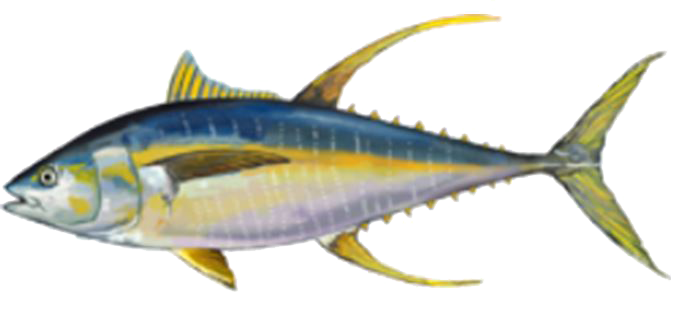
SKIPJACK
- Species: Skipjack (SKJ)
- Scientific name: Katsuwonus pelamis (Linnaeus 1758)
- Classification: Actinopterygii (ray-finned fishes) > Perciformes (Perch-likes) > Scombridae (Mackerels, tunas, bonitos) > Scombrinae
- Distribution area: cosmopolitan in tropical and warm temperate waters. Not found in the Eastern Mediterranean sea.
- Habitat: Highly migratory species. Exhibit a strong tendency to school in surface waters with birds, drifting objects, sharks, whales and may show a characteristic behavior like jumping, feeding, foaming, etc.
- Depth Range: 0 – 260 m
- Temperature: 15-30ºC
- Maximum length: 108 cm, common length till 80 cm
- Maximum weight: 35 kg.
- Maximum reported age: 12 years
- Predators: Sharks, Swordfish, other fishes, tuna fishes and birds.
- Feeding: Feed on fishes, crustaceans, cephalopods and mollusks; cannibalism is common.
- Breeding: Spawn throughout the year in the tropics, eggs released in several portions.
- Eggs and larvaes: pelagic
Management
ICCAT assumes the existence of a single stock for the entire Atlantic Ocean, which shows its main spawning area in the Gulf of Guinea. Its distribution limit is between 45ºN and 40ºS, although the highest densities occur in tropical latitudes. It is mainly caught by surface gear (mainly purse seine and bait) and longline.
Recapture of individuals tagged by the RTTP-IO tagging programme has provided evidence of large-scale movements of yellowfin tuna, which supports the assumption of a single population in the Indian Ocean. For example, the minimum average distance of movement of yellowfin tuna is 710 nautical miles and the distance travelled increases with the time at liberty of the individuals.
SOURCE: AZTI
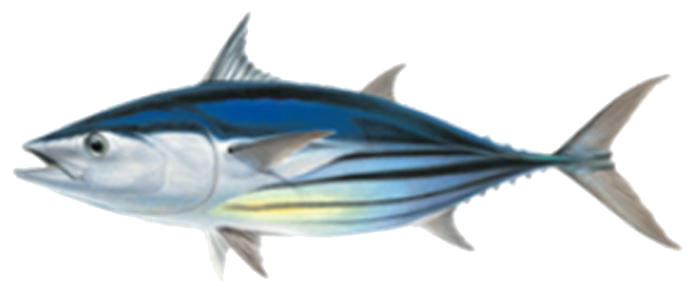
BIG EYE
- Species: Big Eye (BET)
- Scientific name: Thunnus obesus (Lowe 1839)
- Classification: Actinopterygii (ray-finned fishes) > Perciformes (Perch-likes) > Scombridae (Mackerels, tunas, bonitos) > Scombrinae
- Distribution area: Atlantic, Indian and Pacific: in tropical and subtropical waters. Absent in the Mediterranean.
- Habitat: pelagic and highly migratory species. Variation in occurrence is closely related to seasonal and climatic changes in surface temperature and thermocline. Juveniles and small adults school at the surface in mono-species groups or mixed with other tunas, may be associated with floating objects. Adults stay in deeper waters.
- Temperature: Occur in areas where water temperatures range from 13°-29°C, but the optimum is between 17° and 22°C.
- Maximum length: 250 cm., Common length: 180 cm.
- Maximum weight: 210 kg.
- Maximum reported age: 11years.
- Predators: whales, sharks, other tuna fishes.
- Feeding: Feed on a wide variety of fishes, cephalopods and crustaceans during the day and at night.
- Reproduction: Multiple spawners that may spawn every 1 or 2 days over several months. Preferably they spawn between 10º N and 10º S and during April to September.
- Eggs and larvae: Pelagic.
Management
ICCAT assumes the existence of a single stock for the entire Atlantic Ocean, which shows its main spawning area in the Gulf of Guinea. Its distribution limit is between 45ºN and 40ºS, although the highest densities occur in tropical latitudes. It is mainly caught by surface gear (mainly purse seine and bait) and longline.
Recapture of individuals tagged by the RTTP-IO tagging programme has provided evidence of large-scale movements of yellowfin tuna, which supports the assumption of a single population in the Indian Ocean. For example, the minimum average distance of movement of yellowfin tuna is 710 nautical miles and the distance travelled increases with the time at liberty of the individuals.
SOURCE: AZTI
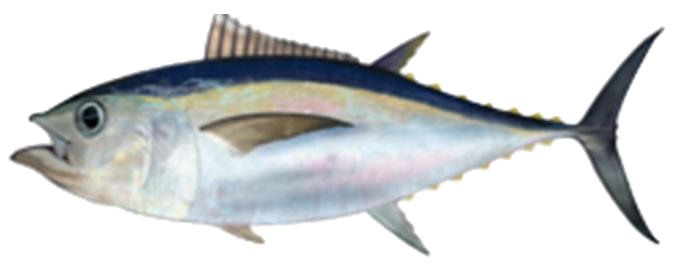
ALBACORE
- Species: Albacore (ALB)
- Scientific name: Thunnus alalunga (Bonnaterre, 1788)
- Classification: Actinopterygii (ray-finned fishes) > Perciformes (Perch-likes) > Scombridae (Mackerels, tunas, bonitos) > Scombrinae
- Distribution area: Cosmopolitan in tropical and temperate waters of all oceans including the Mediterranean Sea.
- Habitat: Highly migratory species. An epipelagic and mesopelagic, oceanic species, abundant in surface waters. Schools may be associated with floating objects, whales, sharks, …
- Temperature: 10-25ºC.
- Maximum length: 140cm, common length: 100cm
- Maximum weight: 60kg
- Maximum reported age: 9 years.
- Predators: whales, sharks, swordfish, another tuna fishes and sea birds.
- Feeding: Feed on fishes, cephalopods, crustaceans and squids.
- Reproduction: Multiple spawners, females spawn almost every day in tropical seas. In temperate waters, this period goes from spring to autumn. Sexual maturity reached at 90cm.
- Eggs and larvae: Pelagic.
Management
ICCAT assumes the existence of a single stock for the entire Atlantic Ocean, which shows its main spawning area in the Gulf of Guinea. Its distribution limit is between 45ºN and 40ºS, although the highest densities occur in tropical latitudes. It is mainly caught by surface gear (mainly purse seine and bait) and longline.
Recapture of individuals tagged by the RTTP-IO tagging programme has provided evidence of large-scale movements of yellowfin tuna, which supports the assumption of a single population in the Indian Ocean. For example, the minimum average distance of movement of yellowfin tuna is 710 nautical miles and the distance travelled increases with the time at liberty of the individuals.
SOURCE: AZTI
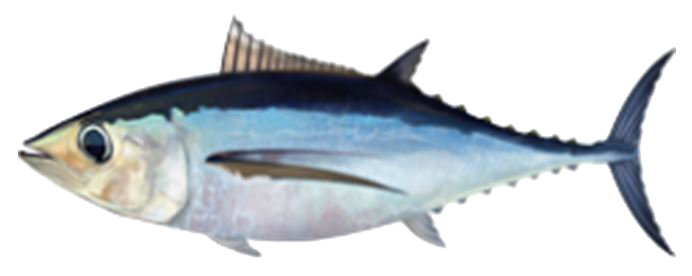
ATUNEROS CONGELADORES Y TRANSPORTES FRIGORÍFICOS, S.A. (ATUNSA) hereby publicly prohibits the practice of shark finning aboard its vessels (ISSF C.M. 3.1 (a)), understood as the retention on board of shark fins and discarding the remaining carcass while at sea, and requires that all sharks be landed with fins naturally attached, if retained.
ATUNSA also prohibits any persons, including captains and crew members, on board its fishing and/or supply vessels from shooting, harpooning, stabbing, or in any way intentionally harming marine mammals, or from eating the meat of marine mammals or selling any part of marine mammals (teeth, blubber, meat, etc.).
ATUNSA also prohibits setting intentionally on whale sharks or marine mammals. In this sense, ATUNSA will not knowingly catch, store, sell and distribute tuna caught by intentional encirclement of marine mammals in purse seine nets in any of the world’s ocean.
ATUNSA, due to its commitment with the environment, since 2015 has not allowed the use of FADs (Fish Aggregating Devices) with a high risk of entanglement, as defined in the 2013 ISSF Guide on non-entangling FADs.
This policy shall apply to all new FAD deployments, regardless of the type of vessel that deploys the FADs.
In this sense, the FADs used by ATUNSA vessels, follow the below guidelines:
- If a net is used in the construction of the grid and/or the submerged part in the oceans that are allowed, they can only be of small mesh (< 7 cms).
- ATUNSA will carry out tests with material without net, aiming that from April 1st of 2025, all FADs will be planted without using nets in every ocean where its vessels operate.
- In visits to FADs that are followed by a change of beacon owned by the fleet, entangling materials will be replaced by non-entangling materials following the criteria defined in the Good Practices Code, whenever appropriate.
ATUNSA will make every effort to use biodegradable materials in the construction of these new non-entangling FADs and will make an effort to collect entangling FADs that their ships locate at sea and take them to the port to treat them as waste.
For this purpose, ATUNSA participates in projects and tests with biodegradable FADs and in FAD recovery programs with the participation of national scientists.
* CM 3.5 will be repealed and replaced by CM 3.7 as of 1 April 2025
ATUNSA, requires onboard its vessels the use of the following best practices for FAD management, identified in ISSF Technical Report 2023-10 which updates ISSF Technical Report 2019-11, “Recommended Best Practices for FAD management in Tropical Tuna Purse Seine Fisheries”:
- Comply with the data submission requirements established by the Flag State and the RFMO science bodies for statistics.
- Voluntarily report additional FAD buoy data (FAD daily position data and echosounder acoustic records) for use by RFMO science bodies.
We commit to provide FAD buoy echo-sounder acoustic biomass data to the relevant national scientific institutions and RFMO science bodies with a maximum time lag of 90 days. Data submissions will include the vessel name and IMO number (if available).In the event that purse seine vessels and supply vessels covered by the policy report these data to national scientific institutions and/or its Flag State, they shall document that they requested that these data be made available to the relevant RFMO for scientific purposes.
In the same way, the daily position data of FADs is provided, within a maximum period of 90 days, to national scientist institutions, and they will share it with the RFMO science bodies.
Data submissions includes the vessel name and IMO and, deployments should be identified when possible. In the event that purse seine vessels and supply vessels covered by the policy report these data to national scientific institutions and/or its Flag State, they shall document that they requested that these data be made available to the relevant RFMO for scientific purposes.
- Support science-based limits on the overall number of FADs use per vessel and/or FAD sets made.
- Use only non-entangling FADs to reduce ghost fishing.
We commit to only deploying or redeploying (i.e. placing in the water) FADs that are completely non-entangling, without any netting components, including both the raft and the tail, according to the ISSF Guide for Non-Entangling FADs.
We also commit to retrieving, where practicable, any encountered pre-existing non-fully Non Entangling FAD (whether a set is done or not) which is not in compliance with this measure as well as to reduce the environmental impacts caused by the loss of FADs through the use of biodegradable FADs and FAD recovery policies. In this sense, we cooperate in the development and application mechanism that prevent the drift of FADs towards habitats and areas with a high risk of standing.
- Mitigate other environmental impacts due to FAD loss including through the use of biodegradable FADs and FAD recovery policies.
We commit to participate in trials of biodegradable FAD designs and test as well as in trials of FAD recovery programs, both with the participation of the relevant RFMO science bodies and/or coastal States, national scientist, and/or ISSF scientist to monitor experimental design.
In addition, ATUNSA participates in projects with AZTI and the Spanish Oceanographic Institute (IEO) for the improvement of the management and knowledge of the impact of FADs, studying the feasibility of deploying simpler and smaller FADs.
- For silky sharks (the main bycatch issue in FAD sets) implement further mitigation efforts.
We commit to applying Best Practices for safe handling and release of sharks and rays brought onboard, providing training to the crew in this matter.
This policy was updated on the 02nd of January 2025.




